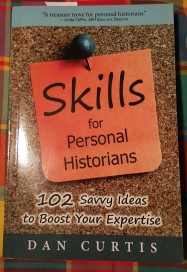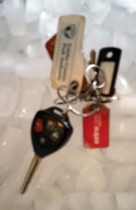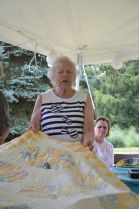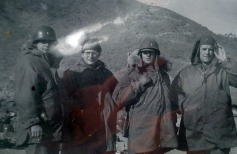I am currently reading and enjoying “Skills for Personal Historians – 102 Savvy Ideas to Boost Your Expertise” by my all-time favorite, though now retired blogger Dan Curtis.
Full disclosure, part of the reason I bought the book was to see how he referenced my story about “Joe and Helen“, page 186. I emailed this story to Dan in response to one of his blogs.
I have been browsing through the book, and yes there are “102 Savvy Ideas”. I recently re-read Dan’s first chapter on “Interviewing Basics”. Well, I am a pretty good interviewer. I have been recording family stories, life stories, human interest, news stories, good practices and even lessons learned stories for over 30 years. But, Dan Curtis had a lot to share. Some of his savvy ideas I already knew. Others, especially mistakes we learn along the way, brought out an inward smile… yep, been there, done that. Hopefully I have learned from these. But, there were also some great new ideas that he had codified through experience and extensive study of his craft – both from interviewing and what I would term as “active listening”. These great new ideas, provoked reflection. In my mind’s eye, I kept visualizing on how I could better hone my craft.
The following are a few of Dan’s ideas from his book. These are followed by my reflections. For Dan’s specific content you should buy the book.
- The Secret to a Successful Life Story Interview
- Good Reasons to Ditch the Laptop and Handwritten Notes
- Are you Creating a Supportive Milieu for your Personal History Interviews?
- Action Steps to a Good Life Story Interview
- Have You Ever Found Yourself in This Embarrassing Situation?
- How to Get the Stories in a Life Story Interview
- Secrets to a Great Interview
- How to Boost Your Interviewing Skills
- What I’ve Learned about Getting “Truthful” Interviews
- Do You Make these Interviewing Mistakes?
This chapter has a ton of great content for those of us who serve as Professional Personal Historians. I think it also has great value for friends and family members who hopefully will make and a resolution to actively listen and record loved one’s stories during the holidays.
A few thoughts…
- Find where the voice recording app is on your Smart Phone, remember that you usually have this in your pocket when you see a friend, or loved one. Schedule an hour to – actively listen, to this friend or loved one. Think about 2 or 3 key questions or stories you always wanted to ask, or a great story you have heard but no-one has recorded it. If practical, you may want to invest in a digital voice recorder that you can carry in your pocket or your pocket-book. Test the voice recorder or the voice recording app ahead of time so you know how it starts, pauses, stops, save, etc. Find a quiet, comfortable place, sit down, start chatting, and then gradually shift to some of the questions you really want to ask and turn on the recorder.
2. The nicest thing about a voice recorder or app is that you can put all your focus on actively listening to the story, making eye contact, nodding quietly, and smiling. My eyebrows go up and my eyes smile when I am hearing a personal story. By actively listening, smiling, and nodding I get to hear fascinating stories from my clients, friend and family members. You can do this too.
3. I love Dan’s word – Milieu. Make your narrator comfortable, put them at ease. I often interview my parents after breakfast, lunch or dinner. I bring some treat from the Swiss Bakery to others. A personal historian colleague told me the story of how she unplugs the noisy refrigerator or freezer and then puts her car keys in the freezer before the interview. Ok, I bit, why? So that she will always remember to turn the fridge back on before she leaves. She turned it off so it wouldn’t rattle or gurgle during the interview. It is harder to drive away, and leave the fridge turned off, if your car keys are still in the freezer. The down side is your keys are really cold when you get ready to leave.
4. Prepare ahead of time, perhaps chat about potential questions for mom, with dad or Uncle Julio ahead of time. Text your daughter or your siblings to ask them what stories they really want to have recorded. Send an email to Great Aunt Sue to gather a bit of insider research before your interview. I usually write out a few outline notes ahead of time. I take a quick glance at these before I go out the door. I think about the stories, or the chapter that we will work on today as I drive over the river and through the woods to my mom’s house, to Joe’s condo. and especially during that long drive early in the morning out to that remote county where my client lives.
5. It is a good idea also to have a checklist of what equipment needs to be charged ahead of time and what you need to carry with you in the car. Yes, I have left the house without my voice recorder and once found that my voice recorder was full when I was ready to start recording.
6. This is a great section in Dan’s narrative… “Is the story intriguing? Am I drawn in? Am I delighted…? If the answer is no, then gently redirect the interview”. Everybody has stories to share, actively listening, with periodic nods and an occasional redirection can make it an even better story.
7. Two lessons I have learned. If you are interviewing a couple, then chat with them for a while to determine whether you should interview them together or whether you should first interview them separately. With my parents, it depends on the topic. Sometimes one will listen and nod while the other is talking, and then sometimes they can’t help themselves they have to jump in. This interrupts the flow of the story. I often find it helpful to interview one by themselves and then the other. However, if it is the right topic… “did he really propose?” Then it is fascinating to hear and record each side of the story together. I have also learned through doing family “Show and Tell” sessions that you can coordinate a great series of recorded interviews by designating one family member at a time to show a treasured object or photo while sharing their story with the group. These group sharing experiences can be powerful.
8. I love Dan’s examples here about staying on topic and not dwelling on trivial details. Encourage your narrator to build upon the flow of the story. Sometimes surprisingly rich details will just flow out. Also, you build up trust the more times you have interviewed someone. You understand more of the context of the stories. The narrator know you are eager to listen and to understand and out will come the story of an incident that they have not thought of for 70 years.
9. Their story is their story. I have been pleasantly surprised when a fact I thought I knew to be true about one family member, actually belonged to a different family member’s story. I remembered clearly that my grandmother told me about the lights dimming in the gym when she was playing basketball. This meant they were electrocuting a prisoner on death row at Sing Sing Prison. My mom corrected me, no… no, that was me when I was in college near Sing Sing. Another time, my client was sure that it was Susie… who got last at the World’s Fair, but a group of three over her children shared, oh, no… it was…!
10. Have I made the interview mistakes that Dan references… yes, these really caused me to reflect. At one time or another I have made each of these mistakes. The good news is that we learn from these. The other good news is that we get better and better at interviewing over time. We learn when to let the interview flow, how to use nonverbal queues to encourage the narrator to continue, and how to actively listen so the story-teller can see we are engaged. They can see that we really want to hear the whole story. We learn how and when to gently nudge or steer the conversation into a slightly different direction. They see we are fighting not to laugh out loud, and sometime we just have to laugh with them. Sometimes I just have to saw Wow!
So wish me luck as I prepare to actively listen through the holiday season. I hope each of you will take time to share and record stories with family and friends during the holidays and during many other days throughout the year.
I wish each of you very Happy holidays filled with fun, fellowship and lots of good stories.
—————————–
Bruce Summers is a Personal Historian with Summoose Tales, summersbw@gmail.com. He also serves as a Board Member and as Director – Chapters and Regions for the Association of Personal Historians





